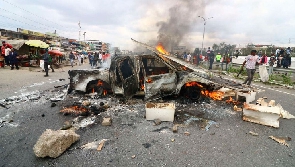Chaos. Anarchy. Disarray. Unruliness. Mutiny. Rebellion. Six words that define the scenes witnessed across the country on Wednesday as thousands of Kenyans protested against the high cost of living and the Finance Act 2023.
But six words that, in the context of the civil unrest, are scant definitions or descriptions of the wave of violence that engulfed the country on a day that President William Ruto was hosting Iranian President Ebrahim Raisi, and on the day that opposition Azimio leader Raila Odinga vowed to lead the nation in a protest movement against the ruling Kenya Kwanza’s policies.
In the end, Mr. Odinga did not need to physically lead the demonstrations. He did not even need to make his signature appearance at Kamukunji Grounds in the city atop his car. For in the six-or-so-hours between sunrise and the time he called a press briefing to announce the cancellation of the Kamukunji rally, parts of the country had already ground to a halt.
Mobs of rioters had disobeyed a police directive not to venture out and protest, and they had been met with brute police force. There were reports of seven deaths as scores were injured.
In the wee hours of Wednesday morning, the boom-boom of gun salutes had echoed from the lawns of State House in Nairobi as President Ruto welcomed Mr. Raisi. Barely a kilometer away on Ngong Road, a bunch of young men had sneaked out of Kibra and were heading towards the city for a face-off with the police.
In Kisii, rioters were already on the streets, as they were in Mombasa, Kisumu, Nyeri, Murang’a and Nakuru.
These contrasting images were a remarkable commentary of the two worlds in Kenya; one where the rule of law and order carried the day, and the other where civil disobedience brought economies, livelihoods, and even lives, to a violent end.
One where the President was unperturbed by the disorder outside the gate to his office and was in fact on a diplomatic foray, and one where thousands poured to the streets, burning tyres, ejecting passengers from matatus, chanting anti-government slogans and engaging police officers in day-long running battles.
If Kisii was the poster child of a region engulfed in total chaos and pandemonium, the small settlement of Mlolongo on the outskirts of the city was the epicentre of riots that disrupted transport, vandalised the Nairobi Expressway, and generally caused mayhem.
So bad was the violence in Mlolongo that the Nation team there reported the deployment of what appeared to be Recce Squad officers, the special, highly trained police unit from Ruiru that has in recent days only been deployed on VIP protection assignments and anti-terror operations.
Video footage from the scene showed the burnt shells of a pick-up truck and what appeared to be a small truck upturned in the middle of the road. In the far distance, the dividing wall of the expressway had been vandalised, the iron fence looted and the thousands of flowers lining it crashed onto the scorched tarmac.

A Kenya Police Officer shoots a tear gas canister to disperse protesters gathering to demonstrate.

A Kenya Police Officer is pictured walking along the vandalised Nairobi Expressway in Nairobi
Africa News of Thursday, 13 July 2023
Source: theeastafrican.co.ke













